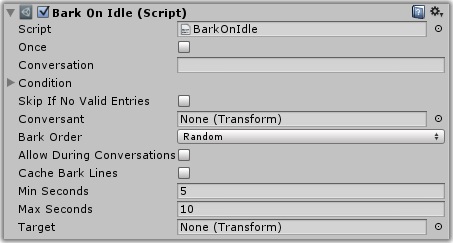Component > Dialogue System > Trigger > Bark On Idle
Bark On Idle barks automatically on an interval.

| Property | Function |
|---|---|
| Once | Bark once and then destroy this component |
| Conversation | The title of the conversation that contains the bark lines |
| Condition | The Trigger Conditions required for the trigger to fire |
| Skip If No Valid Entries | If ticked, don't fire the trigger if no entries have Conditions that are true |
| Conversant | The speaker of the bark. In unassigned, defaults to the component's GameObject |
| Bark Order | Specifies whether to bark the lines in the conversation in sequential or random order or the first valid entry |
| Allow During Conversations | If ticked, the trigger may fire even when a conversation is active |
| Cache Bark Lines | Only evaluate Conditions when the NPC is first enabled, and always use the resulting list of entries (an optimization option for slow devices) |
| Min Seconds | The minimum seconds between barks |
| Max Seconds | The maximum seconds between barks |
| Target | The actor to whom the bark is directed. If assigned, this GameObject also receives "OnBarkStart" and "OnBarkEnd" messages |
This component makes an actor bark every [Min Seconds .. MaxSeconds] seconds. The actor (assigned to the Conversant property) must have a Bark UI.
When an actor barks, it sends "OnBarkStart", "OnBarkLine", and "OnBarkEnd" messages to the Conversant and Target. See Script Messages for more details.
Note that the NPC will not bark if you're using Bark Priority Values and the NPC is currently barking a higher priority line.
Bark On Idle can give a lot of life to your game, allowing NPCs to bark without any prompting from the player. You can make barks react to the current state of the game world by setting Conditions on the dialogue entries and/or using [lua()] Dialogue Markup Tags.
If you want the NPC to bark only when the player is nearby, use a Range Trigger.
<< Components